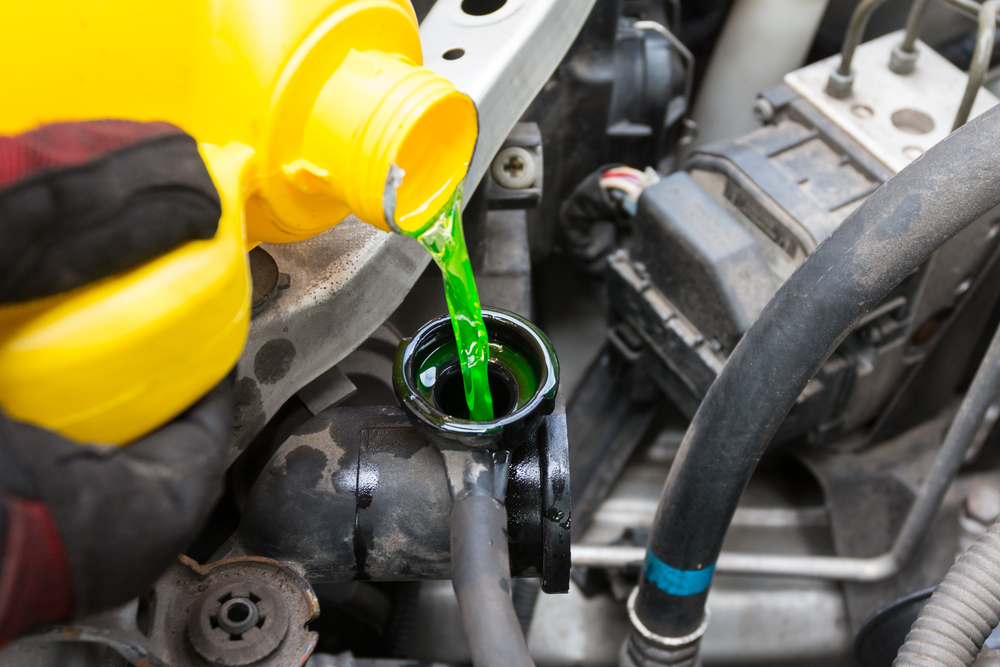What Happens to a Car Without Coolant?

Your coolant is arguably the most crucial fluid you’ll find under your car’s hood. Coolant pulls heat away from the engine, and without coolant your engine would last only a few minutes before suffering a catastrophic breakdown, often resulting in irreparable damage.
What Does Coolant Do?
Engines are remarkable and very complex machines. The metal shell that surrounds each piston contains a small explosion every few seconds, leading to thousands of explosions every minute. This is what powers your engine and moves your vehicle.
As you might expect, these explosions can create a lot – and we mean A LOT – of heat. Over time, this can cause damage to your engine’s shell and other various components of your car. Your car’s cooling system, which heavily relies on a blend of water and antifreeze (coolant), works to keep your engine and its components at the ideal operating temperature.
How Do I Know If My Car is Low on Coolant?
Most of the time, your vehicle will give you a heads up if things are starting to warm up. First, your engine’s temperature gauge will shoot upward, giving you an idea that things may not be running as they should. You might also suddenly notice steam coming out from under your hood, before the temperature gauge has time to tell you; this would likely be due to a burst hose.
If things are bad you may receive a warning on your dashboard from your car’s central computer notifying you that there’s a problem with your cooling system and that you’re on the verge of overheating. If you receive this message, pull over, let your car cool off, and have your cooling system serviced as soon as possible.
Some other signifiers of your car having low levels of coolant include:
- Your car’s heater not working or AC blowing hot air
- Poor fuel economy and driving efficiency
- Sweet smell coming from the cabin when your engine is on
- Pink, yellow, or green fluid or fluid stains on driveway
What Happens if There Isn’t Enough Coolant in My Vehicle?
Nothing good! The coolant is essential to the management of heat in your engine as you drive your car. Without coolant circulating through your car and extracting heat, the optimal temperature cannot be kept. Whether due to a lack of maintenance or a leak, having little to no coolant to extract this heat causes parts to quickly overheat, expand, and break down. Here are three not-fun situations caused by a faulty cooling system.
Damage To Engine Components
If the engine overheats, damage will occur, and there are no if’s, and’s, or but’s about it, especially on older vehicles that don’t have the modern convenience of alerting the driver as the engine heats up. This is an expensive problem to fix, especially if the engine block is cracked or otherwise damaged.
Some engine parts most commonly damaged by overheating include:
- Water pump
- Head gaskets
- Cylinders and piston
- Radiator
- Heater hoses
Engine Seize
A common effect of low or no coolant in your vehicle is your engine overheating and eventually seizing up if continually used. Instead of coolant, air is pushed through the cooling system and causes the engine to lock up completely. Even a small air pocket can cause some parts to be cooled while other parts overheat.
You’ll still be able to use your charger or radio, but you won’t be able to turn over the engine. Instead, you’ll hear a clicking, knocking, or clunking noise. Unfortunately, this damage is often permanent and requires a complete engine replacement to get things back to normal.
Engine Cutoff
On newer vehicles, the central computer monitors the engine’s temperature and can shut the engine off automatically to prevent catastrophic damage to the engine. It also disconnects the ignition from the engine while it cools down, so you won’t be able to turn it on again until it’s cooled off.
While the engine cutoff design is a great safety feature, it may engage at a not so convenient time. This is another reason why frequently inspecting your coolant levels is always a good idea!
How Can I Keep Up on My Engine’s Coolant?
Since coolant does not last the entire lifetime of a vehicle, the fluid levels and quality of the fluid need to be checked regularly.
While some manufacturers recommend full service every 3 to 5 years, our expert technicians encourage a coolant flush every 30,000 miles to keep your engine working efficiently. If you have any concerns that your coolant level is low, or if you don’t remember when your vehicle last had a coolant flush, we highly encourage you to get your vehicle serviced right away!
Turn to The Professionals
Instead of doing your coolant flush on your own, inspecting for leaks, or dealing with other engine and cooling system-related needs, Christian Brothers Automotive can do a thorough inspection for you. We want to change the way you think about car care, and we pride ourselves on offering the best customer service you’ll find anywhere in the auto repair industry. We will inform you of what is going well with your car, potential issues to keep your eye on, and items that need immediate attention. Offering you a long term car care relationship is how we are continually Driving Joy!
For a car repair experience that’s clean, courteous, and caring, choose your neighborhood Christian Brothers Automotive – find your local auto repair shop and schedule your Courtesy Inspection today!
This blog was written in April 2019, and updated in August, 2023 to reflect current industry standards and best practices.


[1].jpg)
sunwash-tech-with-customer.png)

